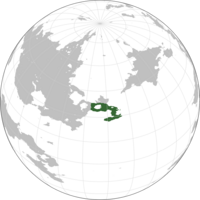Angland
This article is about the metropolitan Angland. For the sovereign state, see Anglish Realm.
Great Kingdom of Angland | |
|---|---|
|
Flag | |
| Anthem: "I Vow to Thee, My Country!" | |
 Map of Anglia in Parthenia | |
| Capital and largest city | Retoria |
| Official languages | Anglish (De-Facto) |
| Recognized languages | |
| Ethnic groups | |
| Religion |
|
| Demonym(s) | Anglish |
| Government | Unitary parliamentary constitutional monarchy |
• Monarch | Diana I |
| Philipa Parish (acting) | |
| Legislature | Parliament of Angland |
| Establishment | |
| 12th July 1112 | |
• Establishment of the Anglish Empire | 1 March 1709 |
| 28 November 1989 | |
| Population | |
• 2020 census | 49,884,032 (not ranked) |
• Density | 117/km2 (303.0/sq mi) |
| GDP (PPP) | 2020 estimate |
• Total | $3.752 trillion |
• Per capita | $55,301 |
| GDP (nominal) | 2020 estimate |
• Total | $3.376 trillion |
• Per capita | $49,761 |
| Currency | Anglish Shilling |
| Driving side | right |
| Calling code | +079 |
| Internet TLD | .an |
The Great Kingdom of Angland, otherwise simply referred to as Angland or Anglia, is a country in eastern Parthenia. It is bordered by Charmelcia to the north and Vermand to the west. It is the most populous and politically central constituent of the Anglish Realm, a sovereign state which includes territories such as Barbodia and the South Bagel Islands. Mainland Angland is located at the end of the Anglican Peninsula and surrounded by the Merillian Ocean.
Angland is a member of a number of important international organisations such as X, X and the United Nations. Angland is one of five permanent members of the United Nations Security Council, showing the nations international importance.
Etymology
The name "Angland" is derived from the Anglican people group who first settled the peninsula in the 1100s, arriving from further west in Eisenland. "Angland" simply means "Land of the Anglicans", with the name evolving overtime into "Angland". The Anglicans originate from the Anglian Lowlands of Deseleria.
History
Early History
Angland was the first nation in Parthenia to be settled by humans during the Great Hominid Migration from Atusia and the east. Despite this, humans are thought to have kept travelling instead of stopping in Angland for any long periods, with little evidence of settlement dating back to before 40,000 years ago. By the end of the region's prehistoric period the peninsula was inhabited by a culture which eventually evolved into Celts, comprising Celtic Anglica and Celtic Charmelcia.
The Remillian conquest of the peninsula began in 49 AD, and began a ruling of Angland that lasted for over three centuries. During this time many grand Remillian structures where built all over the peninsula, notably in places such as Baths and Retoria which still have notable Remillian influence into modern day. Despite this, upon the collapse of the Remillian Empire in 301 CE the Anglican Peninsula was invaded by Germanic Anglo-Deselerian as well as Kellins from the Lokournan peninsula to the north of Angland. Despite this, due to the technological advantages of the Anglo-Deselerian people the Kellins were reduced to Cornkien, where they eventually became the Cornkien ethnic group, as well as to Charmelcia where they became a minority group to the celts in the region. A majority of the land settled by the Anglo-Deselerians became the later Kingdom of Angland. Following this, the Gaelic speaking Celts united with the Picts to form the earliest Kingdom of Charmelcia in the 8th century.
In 1089, Angland invaded neighbouring Vermand and won a great victory in the land, establishing a monarchy in the region that came to be Hartfordland, known as Hartf'rdladet. This region became an early vassal state for Angland, located within former Vermandan lands and in a region split ethnically between Anglish speakers and Vermandan. After conquering Vermand for the first time, they shared feudalism with the state as well as with Charmelcia. Subsequent medieval kings made attempts to annex Vermand and Charmelcia, only being successful with the latter.
Angland soon after, due to it's involvement with Vermand and monarchic links to the crown, assisted with the Vermandan-Eisen War which they were victorious. Due to the rulership of King Louis II (A leader of heavy Vermandan descent) a period of religious instability began during the 1500s resulting from the introduction of Protestant state churches in the country. For a period the vassal state of Hartfordland was encorparated fully into the Kingdom of Angland as well as the previously independent region of Cornkien.
In 1601, Vermand and Angland were temporarily united in the Anglo-Vermacian Union set up by King Arthur I, who had claim to both the crown of Angland and Vermand.
Geography
Climate
Biodiversity
Image Gallery
Politics
Government
Administrative Divisions
Territorial Disputes
Military and Intelligence
United Nations
Economy
Military Spending
Exports
Tourism
Demographics
Ethnic Groups
Only three groups are native to Angland, being the Angles, the Cornkiens of the Cornkien Peninsula and the Charmelcs from the north. The primary group of these are the Anglicans, who have inhabited the peninsula since the settlement from Anglian Lowlands of Deseleria in 1103. The Anglican people are distributed throughout the entire country, as well as in neighbouring Charmelcia and Boroughsford.
Culture
Religion
Cuisine
Arts and Architecture
References


